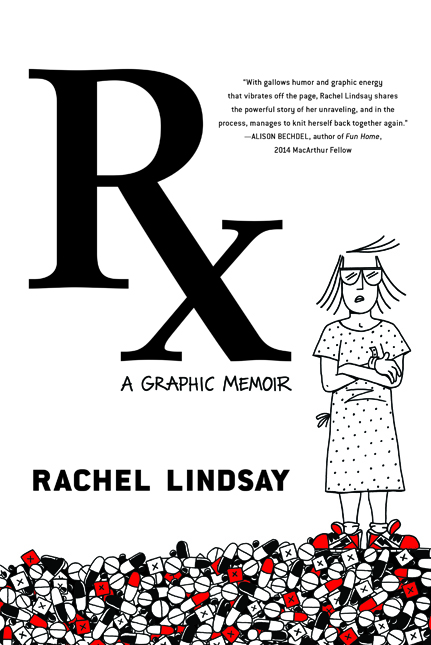Though much is taken, much abides: RX: A Graphic Memoir on corporate America and bipolar disorder
RX: A Graphic Memoir by Vermont-based cartoonist Rachel Lindsay is a memoir borne out of passion, determination, and commitment. Each chapter is short and episodic, and provides a chapter in the story of her unraveling: her time committed to a mental health institution and how she got there. Lindsay writes with a wry dark humor about her struggles to maintain stability with bipolar disease while working in a corporate job.
At nineteen, Lindsay was diagnosed with bipolar disease, a mental illness characterized by episodes of mania and depression. Staying sane becomes her primary objective and the medication her psychiatrist prescribes her helps keep her sane. Lindsay describes this rhythm of her sanity in three panels like a mantra: “Chug. Crush. Toss.”
Rachel Lindsay
Lindsay, whose comic strip, “Rachel Lives Here Now,” about her life as a New York transplant in Vermont, appears weekly in Vermont’s statewide alternative newspaper, Seven Days , has created a memoir that serves as a timely narrative for what many are experiencing in the United States. For the author, as with other Americans with pre-existing conditions, her corporate job is a means to an end, providing her with health insurance and prescription medication coverage. Despite feeling unhappy at her work, she continues at her job. She gets a promotion, which means she gets thrust into the corporate pharmaceutical world and works on a marketing campaign for an antidepressant, Lindsay continues to feel even more trapped.
As a graphic memoir, Lindsay’s style is frenzied, a visual staccato beat that moves her narrative along. The lack of gutter space makes the narrative feel overwhelming at times, yet each panel is concise and detailed. Often metaphorical, her chapters begin with a reflexive lens into the story. In one, she appears in a straitjacket. In another, she’s an “urban badass” ripping her way out of wall graffiti to symbolically step on the dead wind-up toy of her in the first chapter, sunglasses on, smoking, and giving the finger.
RX is also a book about a millennial, a millennial with a mental health condition. Trying to find balance between where you are and where you feel you ought to be, I identify well with that feeling. At a party in Brooklyn in 2010, a partygoer says to Lindsay, “Screw your corporate job and really commit yourself to your art. You’re really talented!!” And throughout her memoir, she struggles to find a creative outlet while maintaining her corporate veneer. Quite literally a wolf in one chapter, dressed in sheep’s clothing, she shows us the precariousness of just passing. And its toll on her mental health.
In her interactions with the system, whether this is the healthcare system, the corporate capitalist system, or the criminal justice system, the graphic writer echoes the frustration and hopelessness of feeling trapped. This shapes her story. The day after she is committed, Lindsay sits alone in a cell. “It’s easier to be angry than sad,” she writes. “Despite the psychiatrist I hadn’t stopped seeing, despite the pills I stopped taking, I sat tagged and overmedicated in a new prison – …waiting to be corrected to fit someone else’s definition of sanity.”
The memoir ends with recognition of the system she is beholden to—though much is taken, much abides. She writes with insight from her struggles with sanity and insanity and the work it has taken to get her to today. Lindsay dedicates the book to Burlington, Vermont, where she currently resides. Though her ending feels abrupt—How did she get where she is now? What happened after moving back in with her parents? What headspace is she in now? —Lindsay writes with calmness, reflection, and grace. This book is a testament of her voice.—Jane Zhao
Jane Zhao
Jane Zhao is a lover of comics because when she has no brain or patience for words, she can escape into image. She is a graduate of the Narrative Medicine program at Columbia University and studied neuroscience at McGill University. She currently works in research in Canada. Talk to her about poetry, Donna Haraway, health policy, and muscle pain.



